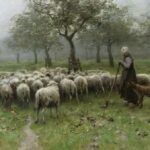“The Things I Tell Myself When I’m Writing About Nature.” In this “not-too-serious and also quite serious list that is entirely non-prescriptive, and is absolutely not a set of instructions,” Helen Macdonald offers 11 principles to guide would-be nature writers.
“Ishmael’s Real Name Was Jonah.” Will Hoyt considers several of Melville’s later works, which most critics rate significantly below Moby-Dick, and argues they evince the same brilliance that defines his better-known novel. But to recognize this brilliance, one has to attend to the role faith plays in his imagination: “Melville’s steadily deepening use of Christian logic might more adequately explain Melville’s development as a writer.”
“Turn Aside: The Poetic Vision of R. S. Thomas.” I endeavor to articulate the contours of Thomas’s imaginative vision:
For many of us, the standard by which we should measure our lives lies in the future, a future where new technologies, political policies, or promotions will enable us to realize our heart’s longings. For others (and Thomas was tempted in this direction), this standard lies in an imagined past: before nominalism, before the Industrial Revolution, before tractors, before smart phones, before some personal loss. We imagine that back then life was sweet, and we measure our present grief by this lost ideal. Yet Thomas insists that life is found when we, like Moses, turn aside from our habitual strivings, take off our shoes, and stand before a miracle that lies outside our expectations.
”The Elite Needs to Give Up Its G.D.P. Fetish.” Oren Cass describes how the pandemic has revealed the bankrupt standards by which American elites judge success: “‘material living standards,’ measured in dollars of consumption (or inches of flat-screen TV), are not the same thing as ‘quality of life.’ They say little about relationships, dignity, agency, or life satisfaction.”
“How Black Farmers Lost 14 Million Acres of Farmland — And How They’re Taking It Back.” Steve Paulson talks with Leah Penniman about her new book, Farming While Black: Soul Fire Farm’s Practical Guide to Liberation on the Land, and her work as a farmer: “Farming is elegantly simple. You put in a seed, you tend it, you harvest it, you feed the community. It’s good.” (Recommended by Michial Farmer.)
“The Non-Voter.” Chris Arnade writes about why so many Americans don’t bother voting for a presidential candidate: “Each election there are three choices and the winner is always not voting. . . . ‘None of the above’ effectively wins every presidential election, and it isn’t even close.”
“I Was a Mail Carrier in Kentucky. Rural America Needs the USPS.” Silas House describes his experience delivering mail and what he learned about the many Americans who depend on this institution.
“The Swift Completion.” A. E. Stallings ponders the history of the USPS (and the origin of its unofficial motto) and the meaning of letters.
“A Requiem for Attention?” Mike St. Thomas reviews Casey Schwartz’s Attention: A Love Story and reflects on the interwoven themes of attention, mindfulness, drugs, and the Christian contemplative tradition.
“Monopolization as a Challenge for Both Parties.” Matt Stoller draws attention to a new study that confirms what should be glaringly obvious by now: “the problems induced by monopolization are virtually endless.”
“How Trump Has Changed the Republicans.” In this excerpt from his new book, Gerald F. Seib considers the possible roads a post-Trump conservatism might take.
“Win or Lose, Trump Will Hold Power Over the G.O.P..” Ross Douthat asks similar questions about the future of conservatism and imagines one hopeful path and two quite disheartening ones.
“How Zeynep Tufekci Keeps Getting the Big Things Right.” Ben Smith talks with Zeynep Tufekci, one of the most provocative guides to understanding digital media and social movements today.
“Why Every City Feels the Same Now.” Darran Anderson describes how and why our built environment is increasingly divorced from the constraints or culture of its place: “A return to vernacular architecture—the built environment of the people, tailored by and for local culture and conditions—is overdue. It can combat the placelessness that empires and corporations have imposed.” (R.M. Stangler levels a similar critique at “airspace” in this FPR essay.)
“Last Days on Speakeasy Street.” Kathryn Watson describes how the summer of COVID fostered new forms of community in her Staten Island neighborhood.
“She Shears Sheep by the Seashore–And in PEI, She’s the Last of her Breed.” Greg Mercer reports on the hard work one woman does to trim the coats of PEI’s sheep each year.
“Much Higher Education.” Michial Farmer argues that a successful defense of the liberal arts has to be theological: “My point is not to argue with employment statistics. It’s simply to state that when we begin our defense of the liberal arts by referring to them, we’ve already given away the store. . . . We’ve agreed that every discipline is the handmaiden not of theology (the most impractical of all!) but of the applied sciences, which are themselves the handmaidens of utilitarian and economic interests.”
“Unsolicited: Advice to a Nephew on Starting a Farm.” Brian Miller gives some practical tips for a young man thinking about buying a farm.







